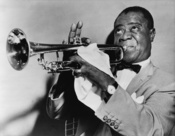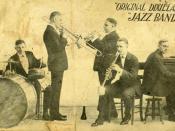One of the major questions that will go forever unanswered is "How did jazz start?" The first jazz recording was in 1917 but the music existed in at least primitive forms for 20 years before that. Influenced by classical music, marches, spirituals, work songs, ragtime, blues and the popular music of the period, jazz was already a distinctive form of music by the time it was first documented.
The chances are that the earliest jazz was played by unschooled musicians in New Orleans marching bands. Music was a major part of life in New Orleans from at least the 1890's with brass bands hired to play at parades, funerals, parties and dances. It stands to reason that the musicians (who often did not read music) did not simply play the melodies continuously but came up with variations to keep the performances interesting.
Since cornetist Buddy Bolden (the first famous musician to be considered a jazz player) formed his band in 1895, one can use that year as a symbolic birthdate for jazz.
During the next two decades the undocumented music progressed but probably at a slow pace. Bolden (whose worsening mental illness led to him being committed in 1906) was succeeded by Freddie Keppard as the top New Orleans cornetist and Keppard was eventually surpassed by King Oliver. Although some New Orleans musicians traveled up North, jazz remained strictly a regional music until the World War I. years.
On Jan. 30, 1917 a white group immodestly called "The Original Dixieland Jazz Band" recorded "Darktown Strutters' Ball" and "Indiana" for Columbia. The often-riotous music was considered too radical to be released at the time so on Feb. 26 the ODJB went to Victor and recorded "Livery Stable Blues" and"'The original Dixieland One Step." The latter performances were immediately released,, "Livery...
![[Portrait of Louis Armstrong and Jack Teagarden, between 1938 and 1948] (LOC)](https://s.writework.com/uploads/4/45429/portrait-louis-armstrong-and-jack-teagarden-between-1938-an-thumb.jpg)

